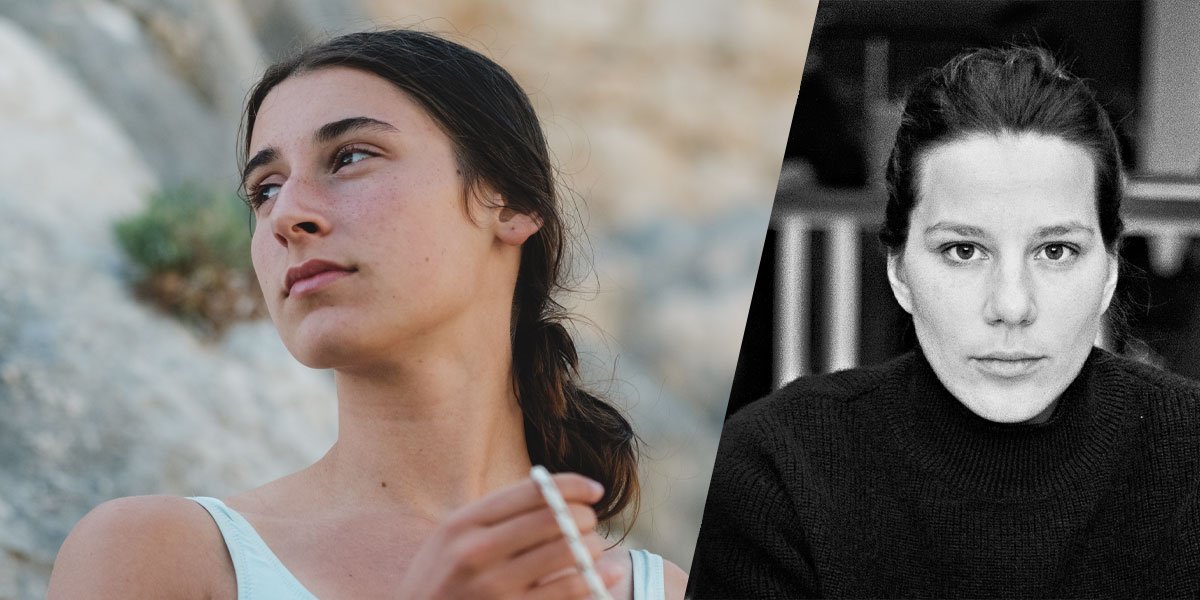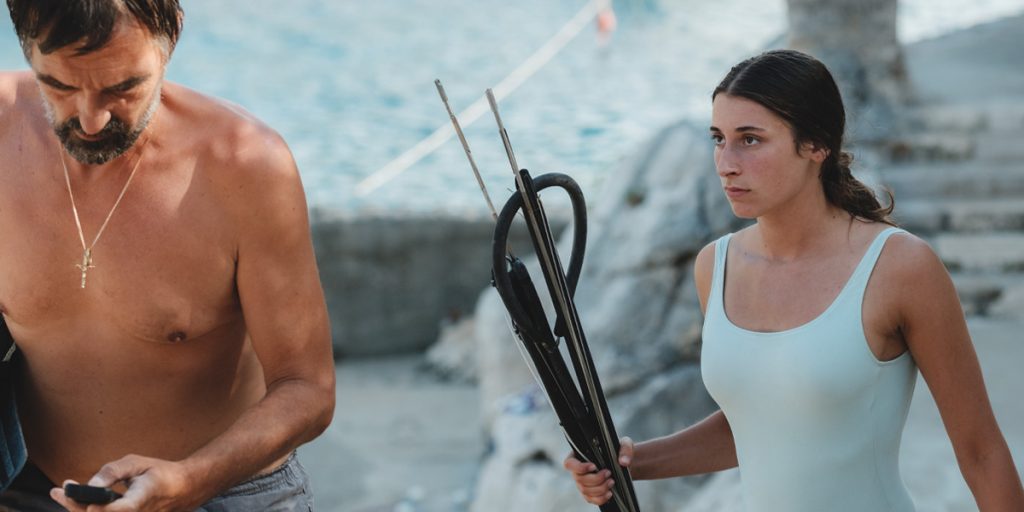Psychological drama Murina masterfully unfolds like a nightmare, as it follows an abusive father and the control he exhibits over his wife and daughter.
With Murina, writer/director Antoneta Alamat Kusijanović has crafted a striking and curious psychological / coming-of age drama hybrid. Her feature directorial debut is a slow burn thriller that peels back layer by layer, moving into darker territory the longer it goes on. Set against the utopic backdrop of the Adriatic Sea, Murina – another word for the moray eel – plays with themes of female empowerment and freedom, hypermasculinity and parental control, and like the psychological abuse on show, it has subtle levels to its treatment of these notions. Sparkling blue oceans and sun-kissed vistas be damned: thisis absolutely not your dream Mediterranean holiday.
Murina follows teenager Julija on holiday with her abusive father, Ante, and often passive mother, Nela. When Ante’s charismatic old friend Javier arrives to discuss a potentially life-changing business deal, Julija’s unhappiness with her life intensifies, stirring up a desire to rebel against her father. The family’s interactions are largely made up of snide remarks – mainly Ante to Julija – and stolen glances between Julija, Nela and Javier. This small main cast of Murina scintillate together and have a twisted and electric chemistry. Leon Lučev (Will Not End Here) as Ante is an imposing, horrible ball of toxic masculinity and aggression, charming his business partners in public whilst verbally and physically abusing Julija and Nela in private. Lučev’s duality and his ability to quickly shift from smile to sneer is terrifying. Danica Curcic (Silent Heart) and Cliff Curtis (Fear the Walking Dead, Doctor Sleep) as Nela and Javier respectively have a searing, sensual chemistry, hinting at an old romance that has never quite been extinguished. And providing the downtrodden but fierce bedrock of the film is Gracija Filipović as Julija, whose electric and varied performance perfectly captures her internalised misery at the constant mistreatment she suffers but also the bravery and strength she draws from it. Where no one else is bold enough to challenge Ante’s authoritarian regime, Julija most surely is.
Murina’s setting is as important as the terrific cast and characters. The beautiful but imposing vistas of the Mediterranean Sea and islands hammer home the loneliness and isolation that Julija experiences; but not the helplessness, for Julijaalways maintains her fight. Hélène Louvart’s (Rocks, The Lost Daughter) cinematography goes further, finding an unnerving dread in the usually crystalline blue oceans. Murina opens with a long shot from these watery, stifled depths, captured in suffocating detail. Brothers Evgueni and Sacha Galperine’s (Loveless) sparingly used original score brings a similarly anxiety-infused tone, the harsh strings and slow beat emphasising Ante’s regime of terror.

 loudandclearreviews.com
loudandclearreviews.comWithin this Adriatic setting is the symbolic, titular moray eel. The fish’s freedom in the ocean and subsequent capture and death at the hands of the family mirrors Julija’s own fight for survival. Her dreams of going to university are encouraged by Javier, who inspires her to believe there is a world outside of her family unit. Filipović injects Julija with a vitality and longing to experience this life, to swim freely like the moray eel do; this is a fish that will bite its own flesh to free itself from fishermen. Kusijanović’s use of symbolism in Murina is frequently impressive, always subtle enough so as to challenge the audience but always accessible and effective.
As Murina’s plot develops, the characters become increasingly at loggerheads: Julija’s anger towards Ante increases with every passing remark or angry grab of her arm; Ante and Javier’s friendship starts to become overwrought with their different forms of masculinity; and Julija’s frustration with her mother’s inaction towards Ante grows and grows. These psychological elements play out masterfully before exploding in Murina’s warped and climactic finale. Moments of liberation such as Julija, Nela and Javier dancing on a boat are swiftly extinguished by Ante’s return from a dive, his mere presence enough to bring their joy back to fear. Even moments where Ante seems to treat Julija with respect quickly dissolve into embarrassment and mistreatment; moments such as forcing her to read a poem out to guests or hoisting her onto his shoulders for a dance have a deeply uncomfortable undertone to them.
The fact that Kusijanović distils such a frightful undercurrent to everything on screen in only 96 minutes hints at a hugely promising filmmaking career ahead. There are moments when the energy wavers, and the slow burn atmosphere sometimes detracts from the emotional fallout, but Murina rarely loses its focus as it hurtles carefully towards its conclusion. Julija is, like much of the film itself, a symbol of hope and power. The constant barrage of harsh words seems to build her strength up rather than knock her down, although Kusijanović is careful not to simplify her journey, still recognising her emotional and mental struggles caused by the abuse. Just like David Lynch’s Blue Velvet (1986), which goes deep into the underworld of a seemingly perfect American town, Murina too finds dread within beauty, slowly building and refining it into something quite unnerving.
Murina is now available to watch on digital and on demand.

